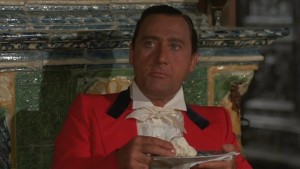 Review: Wisconsin Film Festival
Review: Wisconsin Film Festival
The Most Wonderful Evening of My Life | Ettore Scola | Italy | 1972 | 106 min
Wisconsin Film Festival, UW Cinematheque, Sunday, April 12, 2:15pm»
Wisconsin Film Festival, Sundance Cinemas, Tuesday, April 14, 6:00pm»
A Maserati switchbacking through the Milanese countryside in playful pursuit of a mysterious leather-catsuit-unzipped-to-her-navel motorcyclist—Ettore Scola’s 1972 The Most Wonderful Evening of My Life gives you this hit of unadulterated movie pleasure early. The sequence alternates between long shots and backseat-driver camerawork, with live stunts in the foreground and sun-dappled mountainside behind.
It’s a seduction scene, and like most such scenes, it’s a moral test, and like most such tests, our protagonist is going to fail it. This is Rossi (Alberto Sordi), a salesman of space-age polymers who, when his car breaks down, finds himself in Switzerland at an old-world castle complete with its own count. He’s seduced again when he hears the count is hosting guests for a hunting weekend and, all of them being noblemen retired from legal professions, they enjoy staging mock trials over dinner; perhaps this nouveau riche foreigner would like to play the defendant?
It’s a strangely pitched comedy; rather than funny, it’s silly, and yet also cold-blooded. The denizens of the castle tend to be phlegmatic, stocky-unto-hunchbacked or comely, and every time the tale takes a dark turn there’s a fusillade of lightning and thunder outside the windows—so basically, you know, Young Frankenstein, which would be released two years later—but here, everyone’s a straight man and there are no actual jokes.
Most Wonderful Evening is adapted from a stage play, a medium as inclined to psychologically complex characters as it is to strawmen. While Sordi’s continental swagger happily anticipates the oblivious buffoonery of film fest favorite Jean Dujardin, his character couldn’t be more of a type. At no moment is there a flash that suggests that he is anything other than the perfect cad, the perfect oaf—in another character’s words, the perfect petit bourgeoisie. (Another contemporary comparison would be The Discreet Charm of the Bourgeoisie, also 1972, and maybe you can get somewhere thinking of this in petit relation to that.) Rossi is shallow and obviously due for a comeuppance—and your own shallowness and comeuppability aren’t indicted for wanting it to happen.
Fortunately, Sordi is a great punching bag for his chagrin-manufacturing hosts, most notably Pierre Brasseur and Michel Simon in their near-final film appearances, so there’s a kick to his trial and trials. Scola’s movie has a weird, trippy energy: There’s a lot of handheld low-angle shots, a lot of cuts to outside-looking-in perspectives, even the occasionally looping clip. The movie goes to peculiar places, in that the things that happen are the things that you expect to happen, just not in the ways you expect; it’s that rare slobs vs. snobs comedy that rules in favor in snobs (and is a split decision on the comedy).